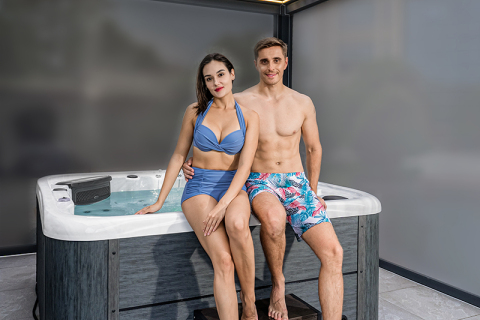
- Home
- >
News
General Power Recommendations For typical 2-person outdoor spa hot tubs, the water capacity typically ranges from 300 to 600 liters. Within this capacity range, a heater power of 3 kW to 6 kW is generally recommended.
Recommended standards for high-end outdoor spa hot tub jets are as follows: · Each massage station is recommended to have 6-10 high-quality, functional jets; · A four-person tub recommends 30-50 total jets, a six-person tub recommends 40-70, and a tub with eight or more people recommends at least 70 jets.
If your outdoor spa jacuzzi bathtub is used frequently, water quality changes may be noticeable, requiring frequent monitoring. In this case, a water quality monitor can greatly simplify water quality management, monitoring water quality changes in real time to ensure optimal water quality.
If your area has hard water, particularly high concentrations of calcium and magnesium ions, installing a water softener will help improve the lifespan of your spa jacuzzi tub and enhance the spa experience. If the water source in your area is soft or pure, installing a water softener may not be necessary.
Unsuitable Locations for Outdoor Spa Hot Tubs 1. Unreinforced natural soil 2. Unenclosed or open areas with exposed drafts 3. Directly under dripping eaves or snow 4. Areas near gas utilities, cables, or high-voltage equipment 5. Low-lying areas without a good drainage system
If using a float-type water level sensor, adjust the float position to ensure it accurately responds to water level changes. Typically, the float should be placed near the bathtub's water level to ensure it rises and falls with water level fluctuations.
The tub's plumbing system is a complex network through which water circulates. If the plumbing isn't cleaned promptly or the filtration system malfunctions during use, water can accumulate in the tub, breeding grounds for bacteria and mold.
Chlorine is one of the most common spa jacuzzi tub disinfectants. It effectively kills bacteria, disinfects, and inhibits algae growth. Common forms of chlorine include calcium chloride (Ca(ClO)2) and trichloroisocyanuric acid (TCCA). The recommended dosage is 1-3 ppm per gallon of water. Generally, add as needed to maintain this range.
For a family of four seeking improved quality of life, family interaction, and restorative relaxation, and with the appropriate space and maintenance capabilities, an outdoor spa hot tub is useful and worth considering. However, its value may be significantly diminished if there are family members with identified health risks, budget constraints, or the inability to guarantee long-term maintenance.
Choose a fixed time daily or weekly (such as 30–60 minutes before bed or on weekend evenings) to create a sense of anticipation and promote long-term benefits. Select the jet pattern according to your needs (direct jet for deep pressure, rotary jet for kneading, multi-hole jet for relaxation), and use zoned controls to alternately target relaxation for the shoulders, back, waist, and legs.
Usually, but caution is advised. When used moderately, an outdoor spa hot tub can relieve nasal congestion through steam, relax muscles through the warm water, and improve blood circulation and metabolism, thereby helping to alleviate some cold symptoms. However, it is not a substitute for medication and should not be used rashly in the presence of a high fever or weakness.
Outdoor spa hot tubs already have a built-in massage function, so there's no need to purchase a separate one. Because: 1. Outdoor spa hot tubs already have a comprehensive massage jet system; 2. The jets are designed to cover the entire body, providing far superior results than a single massager; 3. They offer comprehensive features for relaxation, therapy, and shared use; 4. Buying multiple massagers not only increases expenses but also wastes resources.












